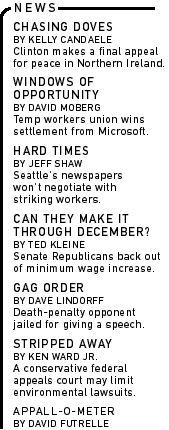 
|

|

|

|
| |
|
|
|
The End of Homework: How Homework Disrupts Families, A few years ago, an old friend put the Excessive Homework Question on the map for me with this story about his 8-year-old son, Charles. Charles' third-grade class had been given the assignment to design a presentation illustrating some aspect of a non-U.S. culture's way of life. Charles' father labored with his son for two evenings to construct a model Cherokee teepee, along with descriptions of Cherokee culture. Confident and excited, Charles bounded proudly into school to present his project to the class. The other project scheduled for that afternoon examined various features of South Korean culture. Garbed in full traditional Korean costume, this student had cooked samples of Korean food for the entire class. While they ate, she discussed South Korean folkways. To cap off the presentation, she distributed to every student a bound copy of a computer-generated cookbook of Korean recipes. Whew! Now that's a lot of homework. Not surprisingly, she got an A for her (and her parents') efforts; Charles (and his Dad) got a C. My friend recounted this story not as a matter of sour grapes--indeed, he felt a bit
The authors' case for ending homework, or for at least keeping it to a bare minimum, is cast within a larger critique of today's corporate culture. They claim that the pressures of the go-go new economy have distorted our otherwise praiseworthy work ethic. Furthermore, they invoke Sam Bowles and Herb Gintis' New Left critique that the purpose of education since the '50s has been not to teach critical thinking or a specific body of knowledge, but to socialize children for work in the corporate workplace--or for the "reserve army" of the unemployed. In today's economy, with its growing class stratification and reliance on computer technology, children from poor and working-class families are placed even further behind the educational and economic eight ball than they were 25 years ago, when the public school system was already coming apart at the seams. So what does homework have to do with all this? And how on earth might curtailing homework provide an issue around which to organize resistance to the new economic behemoth? Before you mock Kralovec and Buell as hopelessly permissive, pie-eyed children of the counterculture, consider their very credible point of view. Circumstantial evidence suggests that homework is increasing, they observe, and that it is being relied upon to do the work of teachers who are strapped for time and resources in a climate ungenerous with education funding. Parents are, in effect, doing "unpaid labor" when they come home at night--labor that should be done by teachers. For that matter, so are children, whose "work" should be confined to the 40-hour week for which labor unions fought long and hard. The best that can be said for the increase in homework is that it involves parents in their children's formal learning process, and keeps them abreast of what's going on--or missing--in the classroom. But in addition to forcing parents and children to do "unpaid labor," there are many other difficulties with rising homework expectations. On a personal level, it turns the kitchen table into a battle zone between exhausted parents--who are already giving enough of their energy to the new economy, thank you very much--and their children, most of whom are already overextended with family obligations and extracurricular activities like sports and community service. Furthermore, excessive homework leaves unfulfilled the developmental needs of children--for fresh-air activity and social play--at the same time that it intrudes on the nondisciplinary, nurturing aspects of parents' relationships with their kids. Politically, homework is no longer just a big drag; it has become downright oppressive. As teachers rely more heavily on homework to "cover" all that they are expected to teach, the authors argue most persuasively, education becomes less an equal-opportunity leveler and more a dividing wedge between social classes. Children with educated parents, a home library, a computer and quiet study quarters are obviously more likely to do their homework, and to excel at it, than those who lack these things. Enmeshed in larger political troubles, the authors claim, excessive homework requires an organized political response. They advise forming "consciousness-raising groups," akin to '70s-era feminism, as a prelude to organizing on the local school-board level. And their ambitions go well beyond this: "We believe that reform in homework practices is central to a politics of family and personal liberation. Taking back our home lives will allow us to begin the process of enriching our community lives. Drawing a clearer line between the school and the home may enable families to reconstitute themselves as families, and help parents to pass on to their children something other than the exhaustion of endless work." Kralovec and Buell's analysis is compelling--so compelling, in fact, that it deserves a better book than the one they've written. Generally it is intended to frame broadly the terms of a movement consisting of parents, educators, academics and policy-makers alike. But the authors offer only the thinnest of gruel for each. For empirical weight, they rely heavily on Harris Cooper's 1989 study Homework, a monograph survey of extant research on the topic, which shows that the influence of homework on student achievement cannot be verified. Studies are about evenly divided on the question, though they incline toward showing that homework is more beneficial on the high school level than in grade school. So the authors support more "ethnographic" case studies, and research based on the "ecological" methods developed in the new field of "family studies"--all of which may be, one must wonder, just as intrusive as homework itself. Oddly, the only original research here comes unfreighted with education-school heavy artillery, and, though only briefly described, it is convincing: Kralovec's successful one-semester experiment with a homework-free high-school classroom. Remarkably, Kralovec and Buell don't really prove that homework is actually on the increase, though it sure does seem that way. What has changed--and this goes unmentioned by the authors--is the passage of a series of federal education laws in 1994, with which the states have been scrambling to comply. Anticipating these changes in 1993, Massachusetts, for example, established regulations that mandated the number of "structured learning time" hours students must spend in school each year. The most zealous administrators have cut study halls and other kinds of unstructured in-school time, during which students in the past had been able to do a good share of their homework. Discussion of the new laws and how they are being implemented might have given reformers something substantial with which to gird themselves for battle with local school boards. So, too, might have discussion of how homework may be affected by the inveterate public head-butting between education reformers and teachers unions. In a general historical chapter, the authors regale would-be activists with tales of anti-homework crusades in the past, notably during the Progressive Era and the '60s. It is interesting to note that in the early years of the 20th century, Edward Bok, editor of Ladies' Home Journal, conducted a nearly one-man anti-homework campaign that resulted in some schools abolishing homework altogether. This is encouraging, but it would have been more useful to learn about how anti-homework reformers have viewed the place of education in a democracy. After all, not all of those opposed to homework were "progressives," as the authors imply; many were conservatives, some of whom questioned the very concept of public education, the absence of biblical teaching in the schools, and progressivism itself. How did these people work together? Or did they? Although the authors do not grapple with such questions, The End of Homework is a useful volume that begins to frame the argument against homework and offers a liberal brief for "family values" absent in the all-too-common pedocentric cant--no mean feat, considering the subject. Kralovec and Buell are, on the whole, persuasive--despite the leaps of faith they ask of their readers, and their unexamined commitment to "personal and family liberation," whatever that means. Liberated or not, parents must have some control over the daily
rhythm and discipline of their families, and we've all heard enough
horror stories by now to know that external demands on our children's
time--including homework--is making that more difficult. Catherine Tumber is a fellow in the W.E.B. Du Bois Institute for Afro-American Research at Harvard University.
|


